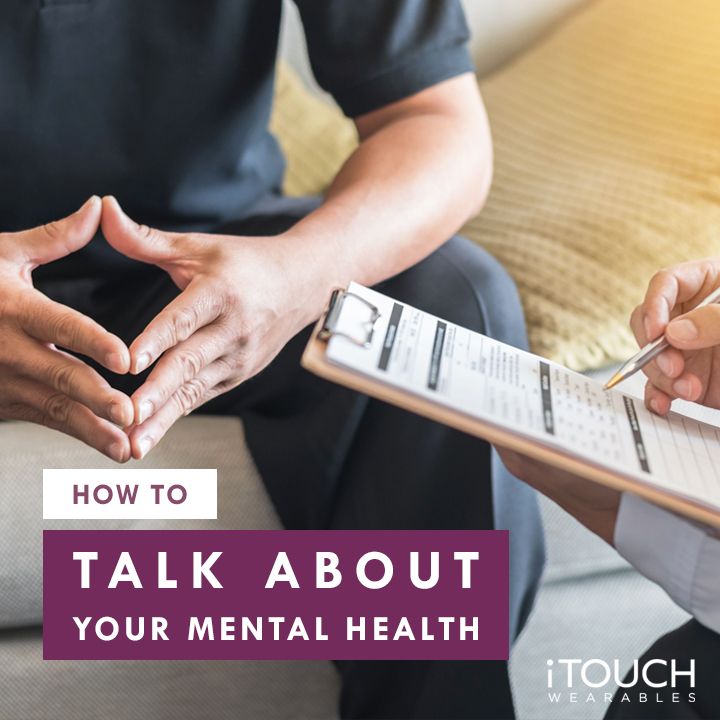
How To Talk About Your Mental Health
With the rise of social media and the phenomena of the influencer, there is an influx talk about the importance of being your true self. In a greater sense, there is a talk about what it means to move away from the fake-ness that lies within the digital world - getting away from the endless portraits of face-tuned, getting passed the pictures of people on expensive vacations, and getting away from the selfies of glammed up people who apparently "#wokeuplikethis." For many, the idea of being vulnerable and transparent across any platform, not even just over social media, can be a terrifying thing, nonetheless can even possibly come with some unwanted results.
Within my life, I have strived to move pass the materialistic and idealized life that social media has created. I found myself and my own ideas of my own self-awareness verses my external perception being tainted by the perfection and influence that these platforms have caused. I wanted to find realness within my life, find a community of people who I can create a safe-space with, create a conversation where it was okay to be open and vulnerable with my thoughts, with what traumas I may have been trying to get over. In a way, I wanted to find people who were similar to me, had struggles and didn't try to hide them away with posed photos, one-thousand post likes, and endless comments.
I took a risk - I started my own digital (and now hopefully by this time, an actual print) magazine over Instagram that aimed in doing just that. I wrote pieces that discussed my experiences with sexuality and mental health. I took strides in being open about my experiences as a queer male and what it is like living with clinical depression and an anxiety disorder. I became comfortable in grounding myself with what made me uncomfortable, finding harmony among the chaos and calm within my mind, spirit, and body. While doing so, I created a platform for people, including myself, to come forward with stories, poems, artwork, photography, and film that expressed their ideas, philosophies, and emotions around themes like identity and sexuality, gender, mental health, and self-care. This platform was a place that became a way for myself and others to heal from our traumas, learn to connect with others that shared similar feelings to what we were going through. In the end, it continues to expand as a safe-space to feel accepted and loved in a community that aims to grow together.
Nowadays, I find myself being more comfortable being able to talk about my mental health and experiences knowing that I have a community of people to accept those experiences and provide advice on how to cope and heal. In my experiences, I find that having trusted people is the most efficient way to talk about mental health. Understand, however, that there are no right or wrong ways to talk about your mental health! These are some things that worked for me, but you may find that you have other solutions. But if you are curious in how I approached it, here are some that I have found:
Take Time For Yourself - Evaluate Every Feeling

I think one of the first steps to talking about your mental health is taking time for yourself to understand your feelings. Think of it as a time of self-reflection. It doesn't necessarily have to be about examining the root cause of the issue, but it should be more about taking the time to ask yourself why you may feel affected by a certain situation or even may be triggered by a certain event or action. For me, I like to take hikes or time outside. I usually find that my mind wanders a bit, but generally when I have an issue, I find that going on a hike helps in allowing me to examine it at every angle. I try to keep my emotions grounded, thinking about what the possible trigger can be and, if possible, what can I do in order to create a solution. While these may work for smaller issues, I find that taking a moment to self-reflect can provide some ease and clarity.
Also in taking a moment to reflect, I find that writing about it really helps get my feelings out. Usually I like to write personal essays or short stories surrounding the situation, but I have friends who love to write poetry or songs to express how they are feeling. Just getting a couple words or sentences on the page can be a huge effort and allowing yourself to understand exactly how you feel.
Find A Support System

After I take sometime to reflect on the situation, if I still find myself having difficulty, I often turn to a friend for advice. I find that this person is genuinely trusted in being a support system, providing me with advice when needed or simply being there to listen. They do not judge me for my actions and aren't going to provide any bias around the feeling or event. While I am definitely lucky to have this person in my life, it wasn't always easy when talking about my mental health with others. There are definitely warnings that need to be considered, as taking the chance to talk about your mental health with another can be risky.
Being able to provide emotional support is something that not everyone can do. It is a skill that needs practice, that everyone has their own way of approaching. Consider making a list of people that you trust in talking about your mental health with. Think about the advice they provide, whether it is genuinely helpful to you or not? Think about how they comfort you in times of need. Do these people actually listen? Do they seem understanding? In asking these questions, it can provide a ton of insight in building the community of people you need in order to talk about your mental health.
How To Approach The Talk

In finding someone to talk about your mental health with, the next step I feel that is effective is actually planning out the day and time you want to talk to them. You'll be able to get the best results in planning the time and not simply being spontaneous about the conversation. Consider the following:
- Having A "Process Talk" - the Process Talk is the initial conversation in which you ask the person to have a conversation with you - essentially you are talking about the talk. You want to prepare your listener for your conversation, being sure you can get across the importance about what you want to talk to them about. For example, you may want to say, "I recently have been feeling really down and depressed, and I am not sure on how to handle it. I feel like you are someone that I can definitely trust with this and would understand, is there a time that can work to talk to you about it?"
- Define A Specific Problem - In helping your listener understand the situation, it may be helpful in providing a concrete example of what the problem may be. You may not have to go into extremely detail about the issue, but let's say, for example, if you are feeling stressed, you may want to be specific about what is causing you stress. It is important to know that every case surrounding mental health is going to be different, do providing an example can provide some clarity on how to properly give advice or support.
- Suggest How Others Can Help You - Some people may not know what exactly you need in getting the help from them. While you may just need someone to listen, or even if you need someone to help you follow through on finding a solution, it may be helpful to actual tell someone what you need.
When it comes to talking about your mental health with others, know that there are also some other tips or things to consider. For example, you may want to set up some sort of boundaries with that person when it comes to your disclosure of your health, or even pinpoint exact points of what you want to talk about. In the end, know what works for you.
Share with us why you think it is important to talk about mental health by tagging us on Instagram @itouchwearables and Facebook @itouchwearables. Also, be sure to check out our new articles published daily!
-Patrick


